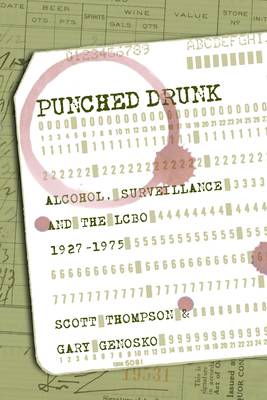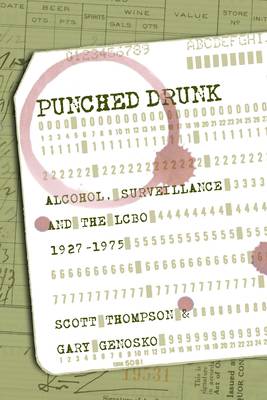
- Afhalen na 1 uur in een winkel met voorraad
- Gratis thuislevering in België vanaf € 30
- Ruim aanbod met 7 miljoen producten
- Afhalen na 1 uur in een winkel met voorraad
- Gratis thuislevering in België vanaf € 30
- Ruim aanbod met 7 miljoen producten
Zoeken
Punched Drunk
Alcohol, Surveillance and the Lcbo, 1927?1975
Scott Thompson, Gary Genosko
Paperback | Engels
€ 20,95
+ 41 punten
Omschrijving
Exposing the stakes and consequences of the enormous bureaucracy behind the administrative surveillance of alcohol consumption, this critical study takes a closer look at the Liquor Control Board of Ontario (LCBO). Beginning with its inception in 1927, this study documents how the LCBO Subjected alcohol consumption to its disciplinary gaze and generated knowledge about the drinking population. The Board's exploitation of technological advances is also detailed, depicting their transition from paper permit books to the first punched card computer systems. Revealing how they tracked any and all alcohol consumption, this investigation records how they created categories and profiles of individuals, especially of women, aboriginals, and the poor, so they could "control" drinking in the province. Examining the categorical treatment of populations such as First Nations, this analysis illustrates how this company helped to develop and foster stereotypes around addiction that persist to this day.
Specificaties
Betrokkenen
- Auteur(s):
- Uitgeverij:
Inhoud
- Aantal bladzijden:
- 222
- Taal:
- Engels
Eigenschappen
- Productcode (EAN):
- 9781552663196
- Verschijningsdatum:
- 1/04/2010
- Uitvoering:
- Paperback
- Formaat:
- Trade paperback (VS)
- Afmetingen:
- 150 mm x 226 mm
- Gewicht:
- 294 g

Alleen bij Standaard Boekhandel
+ 41 punten op je klantenkaart van Standaard Boekhandel
Beoordelingen
We publiceren alleen reviews die voldoen aan de voorwaarden voor reviews. Bekijk onze voorwaarden voor reviews.











